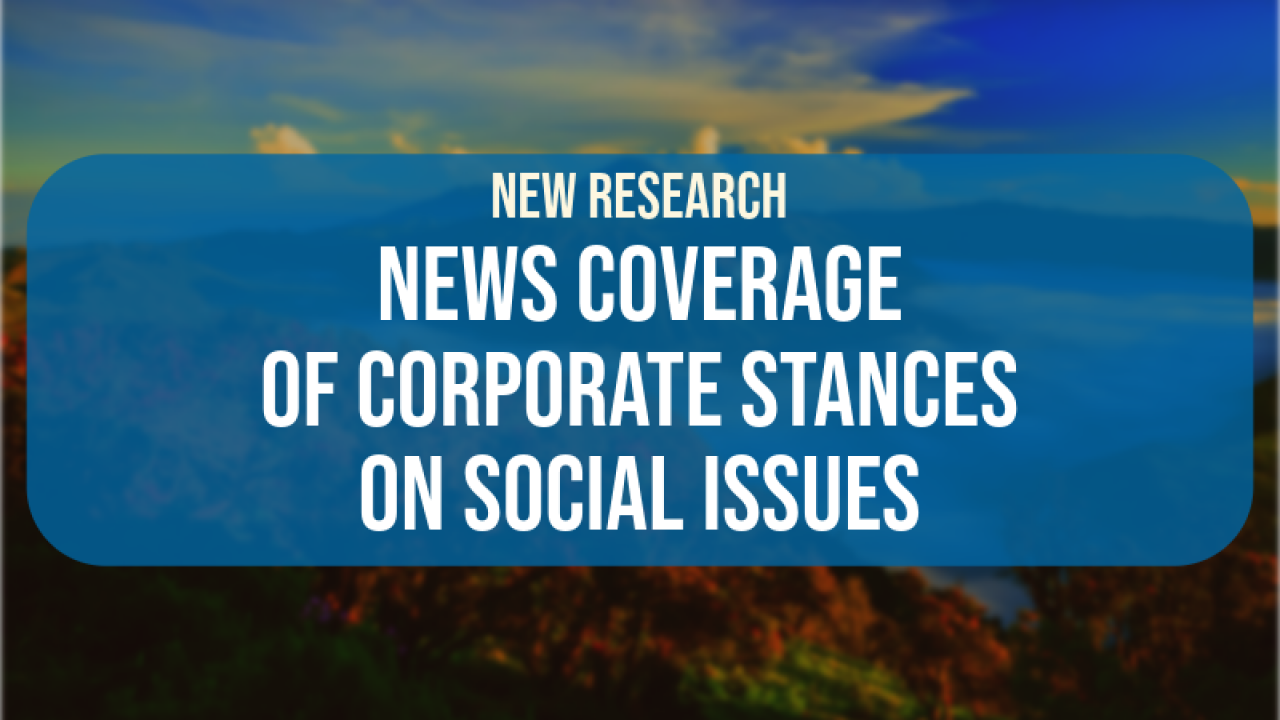April 26, 2024
Generating positive media coverage of corporate sustainability on social issues

By Juan Liu and Lingling Zhang, Towson University
In today’s polarized world, corporate sustainability has become more than just a buzzword; it has become an essential aspect of a corporation’s identity and success. As many corporations show an increasing commitment to a more sustainable behavior, media and public expectations about a corporation's sustainability efforts and operations have increased.
A business that pursues “sustainability” becomes, in the media’s eyes, a “green” company. There is as much media coverage on “corporate greenwashing” as there is on “corporate sustainability." This contributes to such complexity that many companies are portrayed both as role models and villains. The media not only report the positive aspects of corporate sustainability which companies want news media to cover, but also describe the negative aspects, for instance, greenwashing, rainbow washing or woke washing.
Corporate sustainability gains traction due to political polarization and the expectations that corporations address controversial issues. Because social sustainability issues are often less covered in the media compared with governance and environmental issues, more research is needed to explore how corporations better practice sustainability strategies especially when dealing with controversial social issues. To fill this gap, our study investigates how media coverage of corporate sustainability in divisive social issues influences public attitude and word of mouth.
With generous support from the Page Center, we conducted two online experiments to address our research questions.
Study 1 finds a serial mediation that reading positive media coverage of corporate involvement in racial justice issues increases positive valence (i.e., participants’ favorable evaluation of the company’s action), which subsequently leads participants to perceive the corporation to be authentic. This results in positive attitudes toward the corporation and increased word-of-mouth (WOM) intentions.
Study 2 replicates and further advances Study 1 by focusing on a different social issue: gun control. We investigated the moderating role of expectancy in the serial mediation model found in Study 1.
Study 2 reveals that reading positive coverage of corporate sustainability in gun control issues triggers individuals with low levels of expectedness to have positive valence/assign positive evaluations toward the corporation’s actions. The positively assigned valence then leads to increased perceived authenticity of the corporation’s motives, which subsequently increases favorable attitude and WOM toward the corporation.
Results from our study indicate that corporations’ engaging in divisive social issues and earning good media publicity help reaffirm the public’s certainty about their relationship with the company and enhance the perceived sincerity of the company’s motive, which further generates positive WOM.
This means that individuals are likely to speak positively about the corporation that embraces sustainability initiatives because such initiatives make them attribute positive feelings and perceive the corporation as more authentic. This highlights the importance for corporations to effectively portray their sustainability initiatives through news media and interactions with customers.
Crucially, our study shows favorable coverage of corporate sustainability in social issues exerts positive effects on attitude. However, corporate sustainability issues or events are not equally covered in the media. For instance, social sustainability issues such as social justice were peripheral whereas environment sustainability stories are predominant across news media. This means that corporations could use social sustainability issues as a differentiation mechanism to further earn media publicity and boost their authenticity.
By being sustainable, and contributing to society in positive ways, corporations could prioritize certain social sustainability issues to generate positive media publicity, identify, and meet public expectations. Especially, corporations could engage in transparent and honest communications, and clearly align their sustainability communication with stakeholders’ expectations to avoid skepticism or backlash from negative expectancy violation due to negative media coverage.
This project was supported by a 2022 Page/Johnson Legacy Scholar Grant from the Arthur W. Page Center. For further information on this study, please email Liu at juanliu@towson.edu or Lingling Zhang at lizhang@towson.edu.
